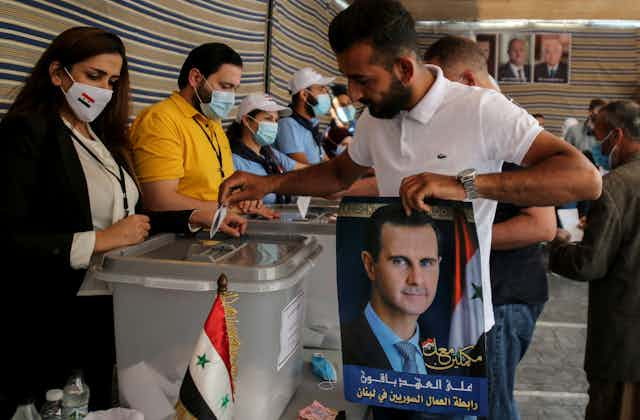The least surprising news of the week from Syria is that Bashar al-Assad has won another seven-year term with 95% of the votes – an increase on the 89% he won in 2014.
Officials said 78.6% of eligible voters, or more than 13.5 million people, cast their ballots in the election on May 26. But western critics have pointed out this is highly unlikely, given that so much of the electorate lives in areas under the control of rebels or Kurdish-led troops, where the vote wasn’t held.
Syria’s minister of the interior, Mohammad Khaled al-Rahmoun, said before the election that more than 18 million people had been eligible to vote, including citizens living abroad. But it has been estimated that 13 million of those eligible would have been unable to cast their ballots, as they were either living outside regime-controlled areas or were barred from voting because they had fled the country illegally and were unable to show an exit stamp on their passports.
Syria is presently divided into four areas of control. The Assad regime controls Damascus, Latakia, Homs, Hama, Tartous, Sweida, and parts of Deraa, Aleppo, Raqqa, Deir Azzor and Hasaka, comprising 12.5 million people. About 3.5 million people live in areas under the control of the Kurdish-dominated Syrian Democratic Forces (SDF) in the east.
A further 3.2 million people live in Idlib in the north, under the control of Hay’at Tahrir al-Sham (HTS) – formerly Jabhat al-Nusra (an al-Qaeda affiliated group). Finally, 1.3 million people are in the north-west of the country under the control of the Syrian National Army (SNA), a plethora of opposition groups and remnants of the Free Syrian Army.

Syria in 2021 is tired and divided after more than ten years of civil war. More than 13.3 million people have been forced from their homes, of whom 6.6 million are registered as refugees by UNHCR. More than 12 million of Syria’s resident population of just over 18 million don’t have access to enough food, according to a report from the World Food Programme.
Assad was up against two little-known challengers, Abdullah Salloum Abdullah, former state minister of parliamentary affairs, and Mahmoud Ahmad Marei, the head of the National Democratic Front, a small, state-endorsed opposition party. They were the only approved candidates of the 31 who applied for nomination.
Contested legitimacy
The election has been widely criticised, including by the “Quint” – the group of governments comprising the UK, US, France, Germany and Italy. A statement from the Quint said:
[We] wish to make clear that Syria’s May 26 presidential election will neither be free nor fair. We denounce the Assad regime’s decision to hold an election outside of the framework described in UN Security Council Resolution 2254 and we support the voices of all Syrians, including civil society organisations and the Syrian opposition, who have condemned the electoral process as illegitimate.
The statement went on to “urge the international community to unequivocally reject this attempt by the Assad regime to regain legitimacy”.
But legitimacy has a questionable factor of every Syrian election since the 1963 coup, in which the Ba'ath Party first took power and excluded all rivals. After a split among separate wings of the party in November 1970, Hafez al-Assad – the father of the incumbent president – orchestrated a coup that became known as the “Corrective Movement”. Rival politicians were condemned to death in absentia and, in 1973, the Syrian constitution was amended to enshrine power in the Ba'ath Party as “leader of the state and society”.
Hereditary dictatorship
Syria became to all intents and purposes a hereditary dictatorship. After the death of Hafez al-Assad in June 2000, his son Bashar al-Assad succeeded him as party leader and head of state.
Aged 34, and educated as an ophthalmologist at Moorfields Hospital in London, Assad junior – whose wife Asma was born and brought up in London – was initially presented as a break from the past. But a brief “Damascus Spring” was followed by a gradual tightening of the reins of power as the president and his oligarchical allies moved to restrict freedom of speech and other political expression.
Read more: 'Every day is war' – a decade of slow suffering and destruction in Syria
The ferocity of the regime’s response to Syria’s Arab Spring protests turned the initial calls for reform to a clamour for revolution. But Assad, with the backing of Russia and Iran, has held on to power and is now generally thought to be fairly secure once again. What is striking, though, is that the Assad regime has been called into question more for its use of violence and the perpetration of war crimes (including the use of chemical weapons) rather than for its lack of democratic legitimacy.
This year’s elections were held according to Syria’s 2012 constitution, which stipulates that presidential candidates have to have been living in Syria for the past ten years, be Muslims and be endorsed by at least 35 of the 250 members of the parliament. At present 177 of the members are affiliated with the Ba'ath Party. This suggests that the prospect of anyone but the favoured Ba'athist candidate – on this case Assad himself – winning the election was always so remote as to be pretty much non-existent.
Assad chose to cast his vote in the Damascus suburb of Douma. The district had been a rebel stronghold before being recaptured in an offensive in 2018, that included an alleged chemical weapons attack which drew almost universal global revulsion at the time. He had a point to prove, as he told reporters while voting:
Syria is not what they were trying to market – one city against the other and sect against the other, or civil war. Today, we are proving from Douma that the Syrian people are one.
Of course, that all depends who is counting.

